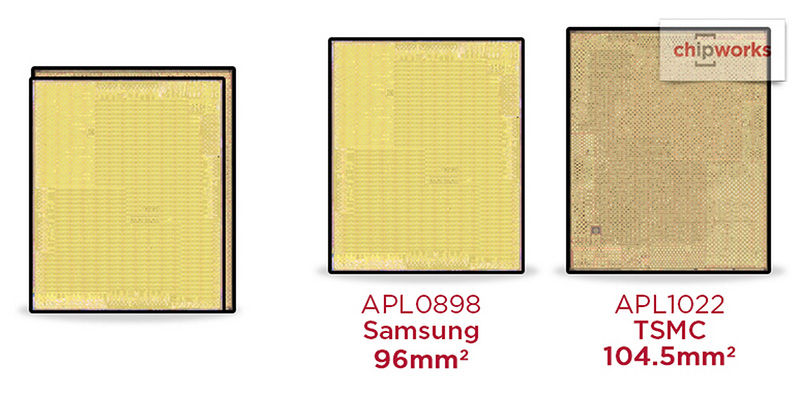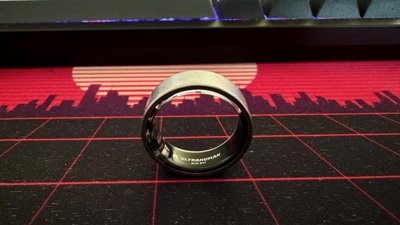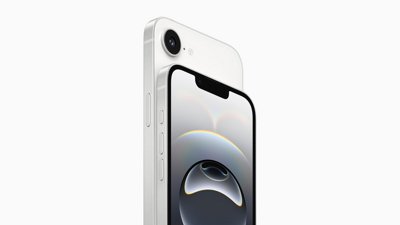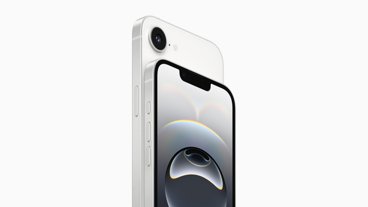It appears Apple divvied out orders for its A9 system-on-chip design, deployed in the latest iPhone 6s and 6s Plus handsets, to both Samsung and TSMC, though Samsung's version boasts a significantly smaller footprint thanks to advanced fabrication technologies.
Researchers at Chipworks discovered the two different application processors — both with A9 labeling — in identical iPhone 6s hardware, confirming previous speculation that Apple would dual-source its next-gen SoC supply. Since Apple traditionally secures all AP orders from one manufacturer, the iPhone 6s' reliance on two producers suggests initial supply constraints.
Perhaps more interesting is that Samsung's A9, part number APL0898, is ten percent smaller than TSMC's iteration, marked as APL1022. The difference in size is to be expected, however, as Samsung is thought to be using a smaller-scale 14nm fabrication process, while TSMC relies on a 16nm FinFET process for its silicon. It is unclear if the two fabrication techniques yield noticeable variations in performance, though energy efficiency usually rises as an inverse function of semiconductor fabrication size. Chipworks is conducting further tests into the matter.
A report in July claimed Apple split A9 and A9X orders between longtime supplier Samsung and TSMC, though the rumor was left unconfirmed until now. The exact allotment is unknown, but rumors have pegged Samsung as responsible for a bulk of A9 orders, with overflow going to TSMC.
It is not yet known if Samsung will share production of Apple's A9X, which will debut in iPad Pro in November as Apple's most powerful A-series chip to date. The Korean tech giant could feasibly supply the entirety of A9X SoCs considering demand for the jumbo-sized tablet is not expected to match that of iPhone 6s.
Apple's iPhone 6s and 6s Plus got off to a blockbuster start with more than 13 million units sold over their first weekend of availability. Helping push the needle is China, which for the first time
 Mikey Campbell
Mikey Campbell




-m.jpg)



 Chip Loder
Chip Loder
 Oliver Haslam
Oliver Haslam
 Malcolm Owen
Malcolm Owen
 William Gallagher
William Gallagher
 Amber Neely
Amber Neely

 Andrew Orr
Andrew Orr








34 Comments
Apple must be expecting to sell a LOT of devices if they went with two suppliers.
It will be interesting to see their benchmarks for performance and power consumption. This could be the first actual device in history that's made on two competing processes at the same time. This would allow direct comparisons to see if there are any significant differences between the two. People automatically assume Samsung 14nm is superior to TSMC 16nm, but now we'll actually be able to find out.
EDITED: Went to the Chipworks site and they basically said the exact same thing I did:
"
Indeed.
I'm curious if they did something like put one supplier in 6S and one in 6S+ models. Either if the 14 nm process produces better performance, then put it in the plus, or if it's a bigger difference in power usage then perhaps putting it into the 6S with the smaller battery.
I'm curious if they did something like put one supplier in 6S and one in 6S+ models. Either if the 14 nm process produces better performance, then put it in the plus, or if it's a bigger difference in power usage then perhaps putting it into the 6S with the smaller battery.
Chipworks stated they found the two processors in two identical phones.
Chipworks stated they found the two processors in two identical phones.
Interesting. I guess I should've read the whole article!
[quote name="EricTheHalfBee" url="/t/188558/both-samsung-and-tsmc-confirmed-as-apple-a9-soc-manufacturers-samsung-version-10-smaller#post_2783426"] Chipworks stated they found the two processors in two identical phones. [/quote] So now are we going to get chipgate where people demand to know which chip is in their phone and if their phone runs a bit hot or they encounter battery life issues they'll be demanding Apple swap out their phone for one with the smaller chip. It wouldn't surprise me. :rolleyes: